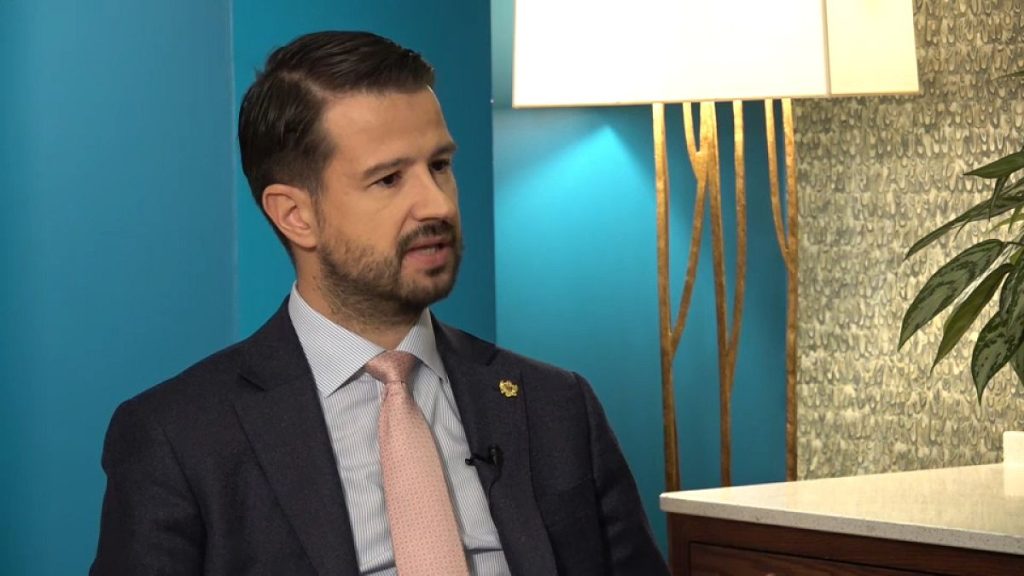Jakov Milatović, Montenegro’s youngest-ever president, ascended to power on a wave of pro-European Union sentiment, winning a decisive victory in the May elections. A trained economist and former minister of economic development, Milatović embodies a generation eager to integrate Montenegro into the European fold. His presidency, however, faces the complex task of balancing this fervent desire for EU membership with the delicate diplomacy required to maintain stable relations with Serbia, a historical partner with whom Montenegro shares deep cultural ties but divergent political views, particularly regarding the recognition of Kosovo. This nuanced balancing act forms the backdrop against which Milatović navigates the intricate path towards EU accession, a journey marked by both challenges and opportunities.
Milatović’s pro-EU stance is unwavering. He recognizes the hurdles ahead, acknowledging that the path to membership is paved with necessary reforms. He views these reforms, encompassing areas like judicial independence, freedom of expression, and anti-corruption measures, as not merely prerequisites for EU accession but as essential building blocks for a stronger, more democratic Montenegro. He underscores that the true value of the EU integration process lies not simply in accessing financial aid, though he acknowledges its importance, but in the transformative power of the reform agenda itself. This agenda, he argues, serves as a constant compass, guiding policymakers towards establishing a society rooted in the rule of law, good governance, and transparency. This commitment to fundamental democratic principles forms the core of Milatović’s vision for Montenegro’s future, a future he believes is inextricably linked to its integration within the EU.
Milatović’s perspective on EU membership extends beyond the domestic benefits of reform. He views the enlargement process as a crucial element in ensuring the security and stability of the entire European continent. This perspective, he notes, has gained traction in Brussels and other European capitals, particularly in the wake of Russia’s invasion of Ukraine. The geopolitical landscape has shifted, highlighting the strategic importance of integrating the Western Balkans into the EU fold. This renewed focus on enlargement, driven by security concerns, presents a window of opportunity for Montenegro and other aspiring members, offering a more receptive environment for their accession bids. Milatović sees this momentum as a positive sign, reinforcing his belief that Montenegro’s future lies firmly within the European Union.
However, the path towards EU membership is not without its internal challenges. Milatović candidly acknowledges the setbacks Montenegro has faced in its reform efforts, including unresolved attacks on journalists and a lack of independence in the national broadcaster. These issues represent significant obstacles to fulfilling the democratic criteria required for EU membership. Despite these challenges, Milatović remains committed to addressing these shortcomings, recognizing that strengthening democratic institutions and protecting fundamental freedoms are essential not only for EU accession but for the overall well-being and progress of Montenegro. His willingness to confront these internal issues underscores his dedication to building a truly democratic society.
The delicate relationship with Serbia further complicates Montenegro’s path towards EU integration. The recognition of Kosovo remains a major point of contention. While Montenegro has formally recognized Kosovo’s independence, Serbia steadfastly refuses to do so, creating a diplomatic tightrope for Montenegro to walk. Milatović must carefully navigate this sensitive issue, maintaining open communication with Serbia while upholding Montenegro’s sovereign decisions. This delicate balancing act requires diplomatic finesse and a commitment to maintaining regional stability while simultaneously pursuing Montenegro’s European aspirations. The ability to manage this delicate relationship with Serbia will be a crucial test of Milatović’s leadership.
In essence, Jakov Milatović’s presidency represents a pivotal moment for Montenegro. He embodies a new generation of leadership, driven by a strong pro-EU vision and a commitment to democratic reform. He recognizes the challenges ahead, both internally and in the complex relationship with Serbia, but remains undeterred in his pursuit of EU membership. He views this not just as a political goal, but as a fundamental step towards ensuring Montenegro’s security, prosperity, and its place within the European family. His success will depend on his ability to navigate the complex political landscape, to effectively implement necessary reforms, and to maintain a balanced relationship with regional partners while steadfastly pursuing his European vision for Montenegro.

